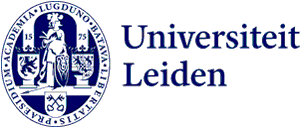
Leiden was buzzing on the Evening of Languages
What does it sound like when you create your own words in Chichewa? Can you decipher hieroglyphs after just one workshop? Visitors found answers to these and many other questions during the first edition of the Evening of Languages, held in the brand-new Herta Mohr Building. With a sold-out programme, a buzzing atmosphere and over thirty activities, the event showcased how rich, surprising and unifying language can be.
Watch the aftermovie!
Due to the selected cookie settings, we cannot show this video here.
Watch the video on the original website orFrom families and students to alumni and staff – everyone was welcome to explore the diverse linguistic landscape offered by Leiden University.
Between 7:00 and 10:00 PM, attendees could choose from no fewer than 30 activities, spread across three rounds. Workshops, lectures, a pub quiz and even an escape room made for a dynamic and engaging evening.
Escape Room with African languages
Jenneke van der Wal, lecturer and researcher in African languages, saw her passion come to life:
‘It was such a joy to see people puzzling over African languages! We heard participants creating their own Chichewa words and really thinking like linguists.’
Medieval English in the spotlight
One of the most popular sessions was the lecture by Thijs Porck, lecturer and researcher in Medieval English:
'A lively room filled with language enthusiasts discovered the magic of Old English, a key source of inspiration for Tolkien’s The Hobbit and Lord of the Rings. Almost without their noticing, Tolkien introduced his many readers to medieval language, literature and culture. It was great fun to make people aware of this and to invite them to delve deeper into the English.of the early Middle Ages.’
-
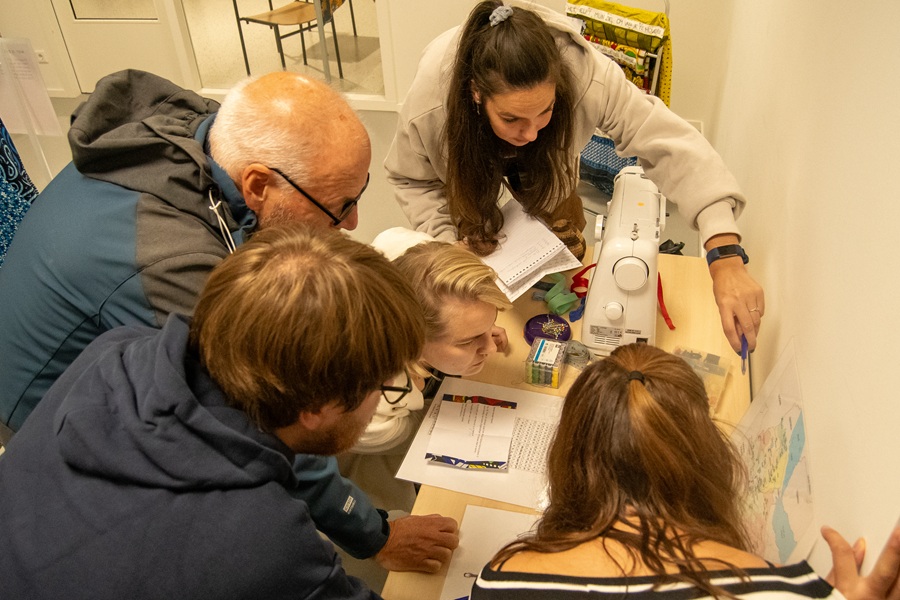
Participants in the African languages escape room in intense concentration -
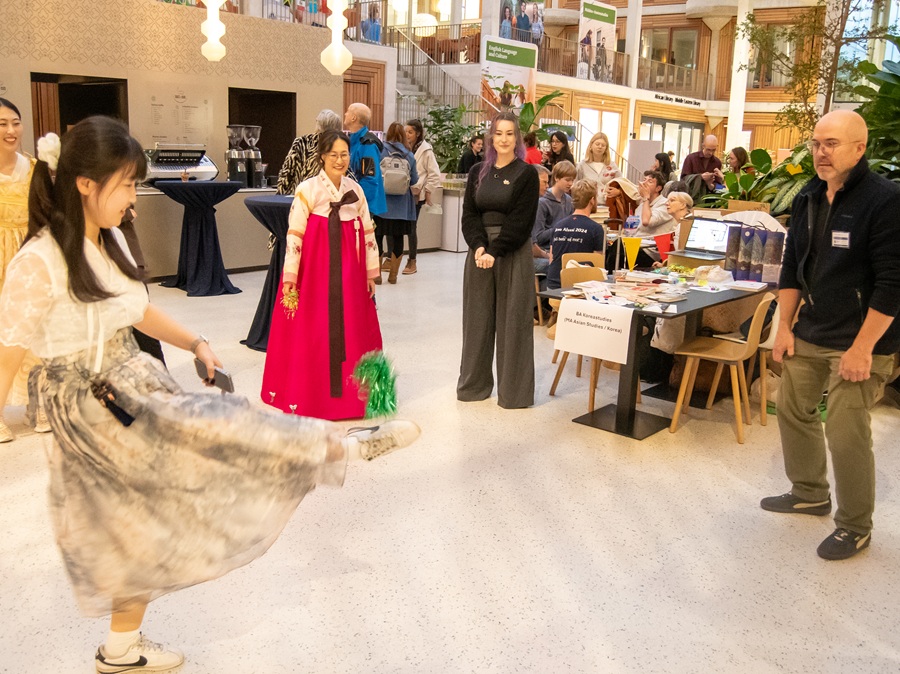
Traditional Korean games in beautiful traditional costumes at the language market -
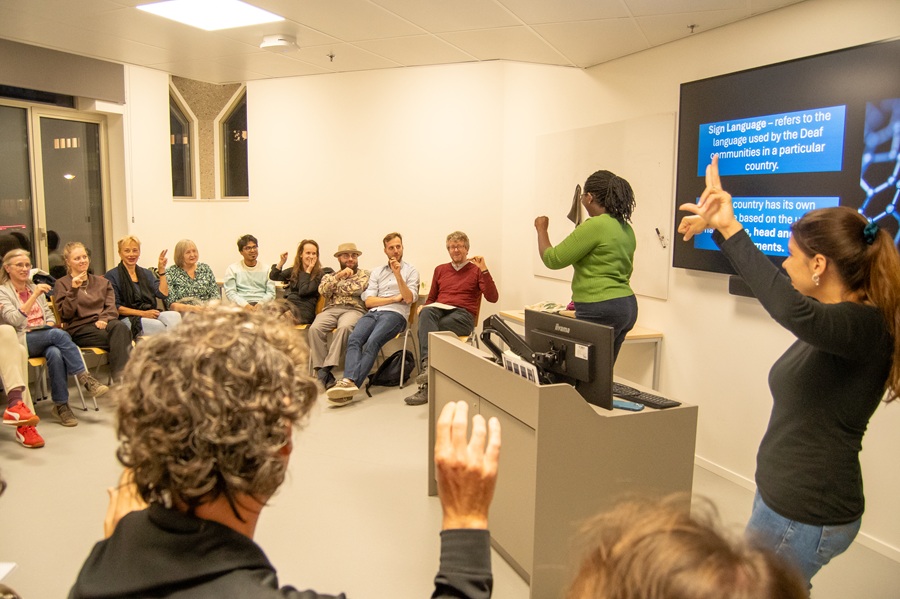
During the crash course in sign language, a message was passed between the participants. -
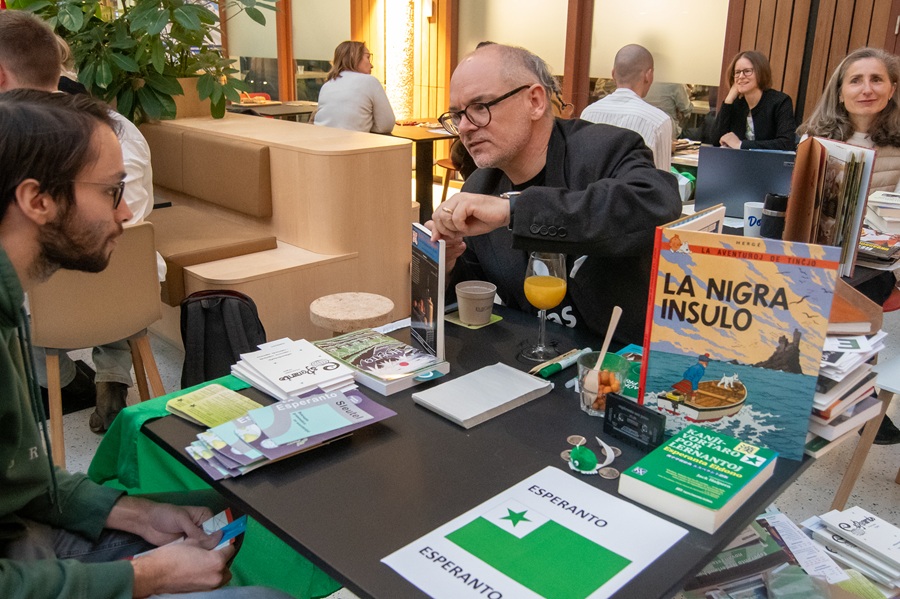
At the language market, you could engage in conversation with language teachers and embassy staff in a foreign language, such as Esperanto. In collaboration with the European Commission -
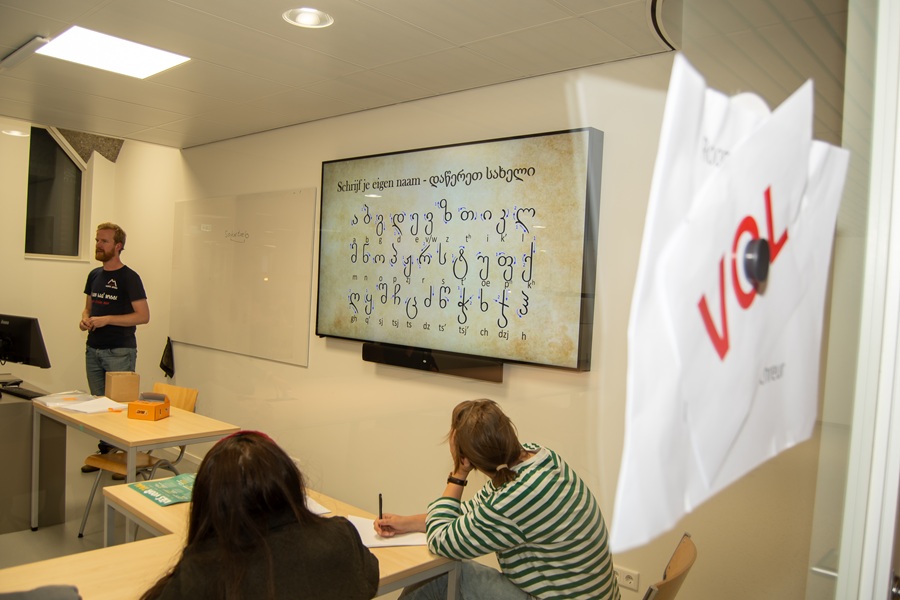
One of the many workshops on offer: a crash course in Georgian. -
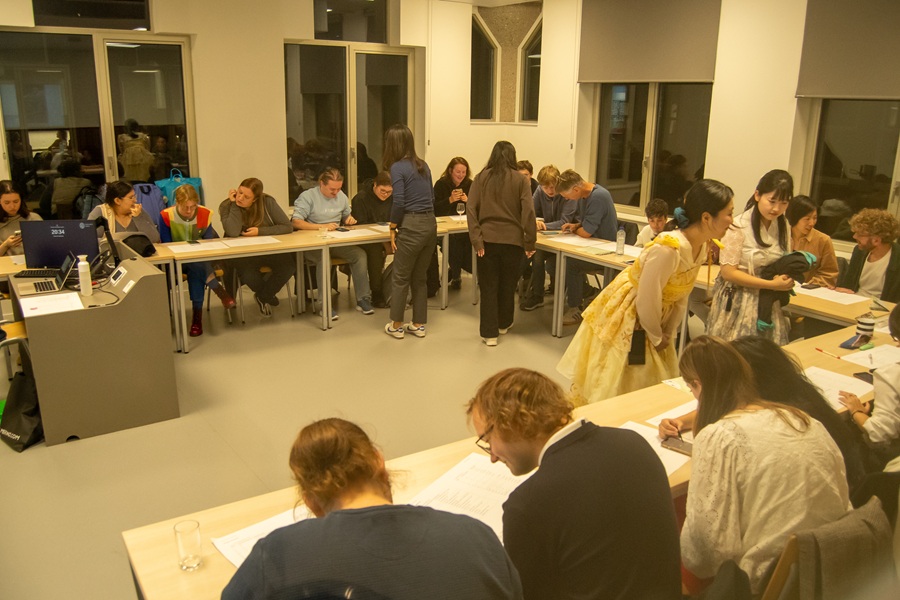
At the workshop “Read Korean in 40 minutes”, you could get started with decoding simple words. -
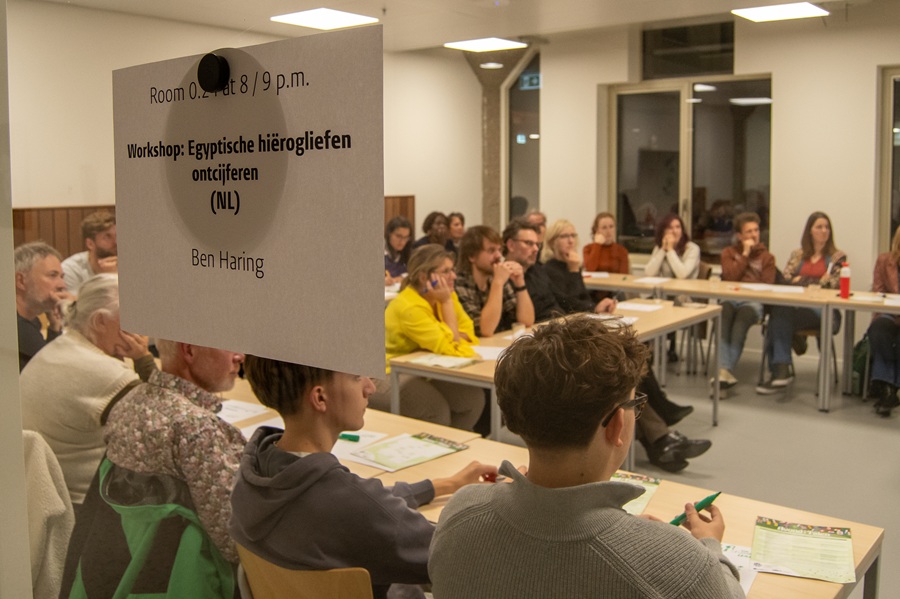
After completing the workshop on deciphering Egyptian hieroglyphics, you were able to read fragments of hieroglyphic text yourself. -
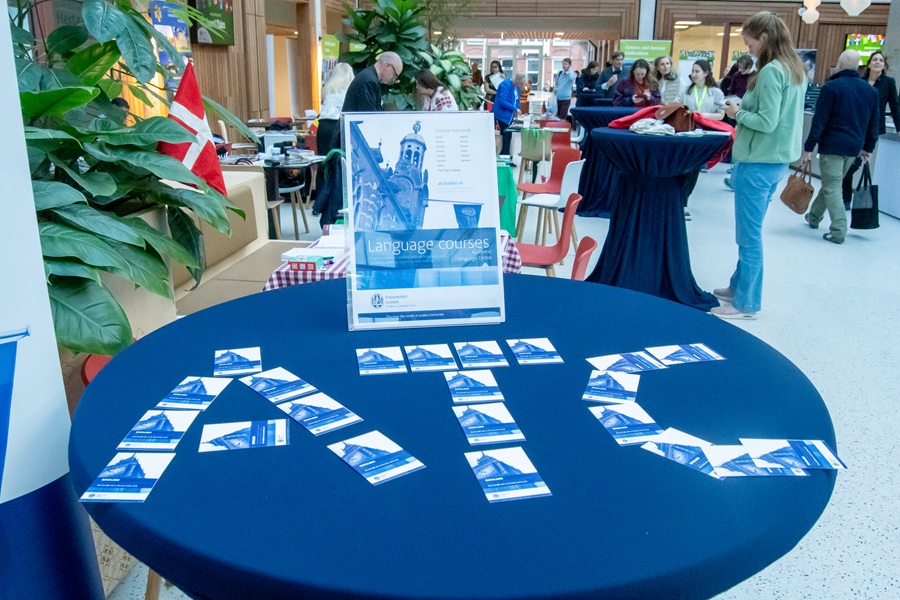
At the Academic Language Center Leiden visitors could find language courses in a wide range of languages, both for beginners and advanced students -
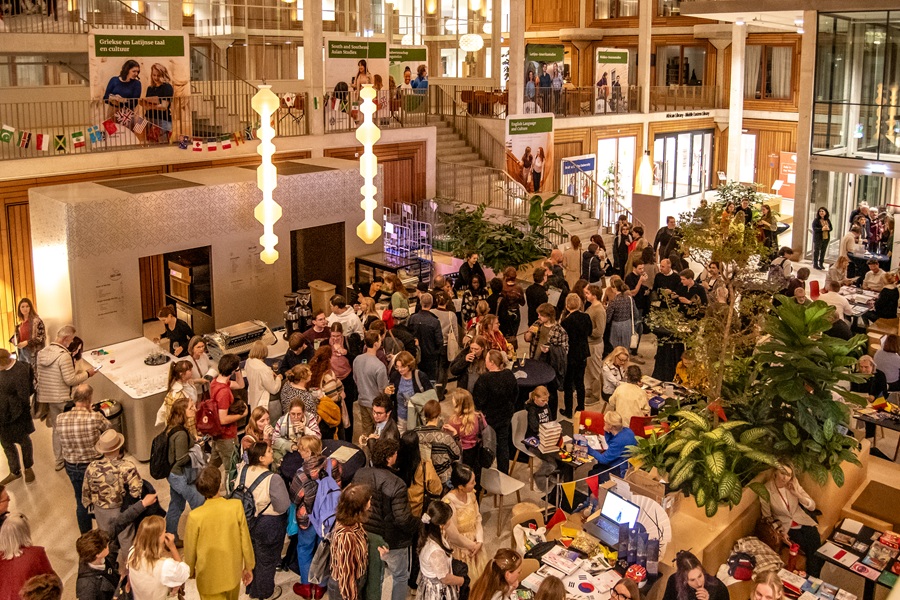
The first edition of the Evening of Languages attracted 350 visitors, and the atmosphere was great!
Quizzing for Classical Glory
Another highlight was the Know Your Classics! quiz, focusing on Greek and Latin.
Casper de Jonge, Professor of Greek Language and Literature:
‘Which city is referred to as Batavian Athens? What words did Caesar speak when crossing the Rubicon? What does panem et circenses mean? No fewer than 16 teams competed fiercely and cheered passionately. Team Ptolemayonnaise scored an impressive 35 out of 40 points – and, of course, earned eternal glory.’
Rhetoric with a Controversial Twist
Maarten van Leeuwen, university lecturer in Dutch, captivated his audience with a lecture on rhetoric and controversial statements. Using current examples, he introduced the classical concept of status theory.
Tessa van Kats, student in the Research Master’s in Arts, Literature and Media:
‘I was familiar with the principles of rhetoric, but not with status theory. Also, I had studied rhetoric in English, not in Dutch. That made the similarities between languages and how they are handled very clear. An evening like this shows how each language has its own way of tackling linguistic issues – and how languages can learn from one another.’
Sign Language Across Borders
A special workshop focused on African Sign Language. Participants covertly passed on newly learned signs to one another, with a final check to see how effectively the information had been transmitted.
Sign language instructors Deborah Oyuu, Inocêncio Joao Raul, Débora Campos Wanderly and Gláucia Rodrigues Vermue were impressed:
‘The event was absolutely fantastic – an evening full of energy, curiosity and humour. It was truly inspiring to see so many participants eager to learn, share and celebrate the beauty of different languages and cultures. We left the evening feeling energised, inspired and grateful for such a vibrant community.’
Language Market: Speak Dating and Tasting Diversity
In the centrally located atrium, the Language Market offered visitors the chance to ‘speak date’ with embassy staff and language teachers, picking up a few words of Croatian, Irish, Maltese, Papiamento and even Esperanto. At the Leiden Academic Language Centre, attendees could sign up for language courses.
Jan van Oosten, organiser of the Language Market on behalf of the European Commission, emphasised the importance of language in Europe:
‘We live in an EU with 24 official languages – and that’s not even counting the regional ones. This diversity makes Europe rich and beautiful. Events like this promote language interest in an accessible way.’
Looking Ahead to Edition Two!
The post-event survey shows that visitors are looking forward to a sequel. Good news: keep your diary free on Saturday 26 September 2026, because plans for the next edition are already being made.
Would you like us to keep you posted? Let us know now and leave your details!
